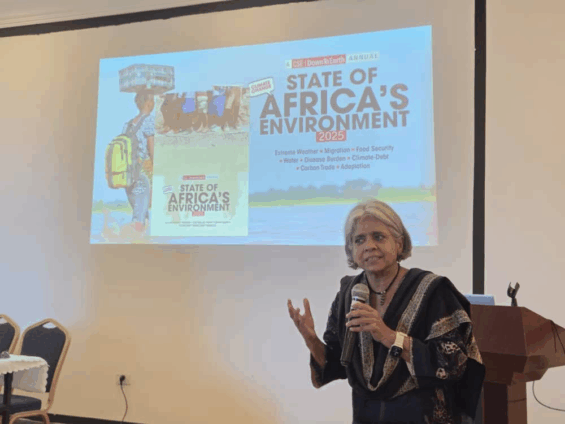Published
5 months agoon
By
Adubianews
Africa is confronting its worst period of climate and environmental disasters in modern history, according to a new report by the Centre for Science and Environment (CSE) in India.
The 152-page “State of Africa’s Environment Report 2025”, released today in Ethiopia, warns that between 2021 and 2025, the continent has endured unprecedented devastation caused by rising temperatures, prolonged droughts, deadly floods, and food system breakdowns.
The report reveals that in just 15 years, extreme weather events have affected 412 million Africans, with over half of those impacts recorded in the past five years. Since 2021, more than 41,500 lives have been lost, while droughts alone have crippled the lives of 178 million people.
Across the continent, the human toll is staggering. In Kenya and Ethiopia, recurring droughts have decimated pastoralist livelihoods, forcing communities to abandon their herds and migrate in search of survival. In Nigeria and Ghana, torrential floods have submerged entire settlements, displacing families overnight.
CSE Director Sunita Narain urged the global community to step up, saying it is time to “fulfill commitments, take responsibility, and bring others into the fight against global environmental challenges.”
The report cautions that without urgent measures, Africa could soon face the world’s highest rate of climate-related displacement. Already, 265 million people were forced into internal migration in the past year, and projections warn that up to 5% of Africa’s two billion people could become environmental migrants by 2050.
Other experts echoed the urgency of action. Dr. Rita Bissoonauth, Director of the Addis Ababa Liaison Office to the AU and UNECA, stressed that climate change is not only an ecological emergency but also a crisis of inequality, hitting the least responsible communities the hardest. She called on journalists to “humanize climate stories, track financing, and amplify local solutions.”
Meanwhile, Professor Kassahun Tesfaye, Director General of Ethiopia’s Bio and Emerging Technology Institute, pointed to the potential of a sustainable bioeconomy, urging Africa to harness its crops, forests, livestock, and microorganisms within a circular and regenerative system.
Although Africa is bearing the heaviest costs of a crisis it contributed little to, the report notes that the continent is uniquely positioned to lead with homegrown solutions that turn vulnerabilities into opportunities for resilience.

























